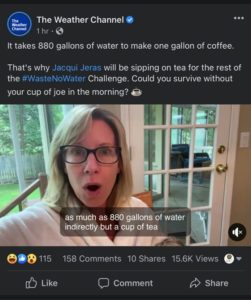A new article in Reuters is making waves in the climate world, titled: “If your coffee’s going downhill, blame climate change.”
The Weather Channel, seemingly trying to jump on a newsworthy headline, made a post on Facebook about taking the “#WasteNoWater” challenge by drinking tea for a day instead of coffee, to help with climate change.
The post goes on to claim that making one gallon of coffee requires 880 gallons of water. The video with  the post clarifies that this water is used “indirectly.”
the post clarifies that this water is used “indirectly.”
The majority of reactions to the post were Facebook “laugh” reacts, showing disdain from followers for the post. Most comments were critical and tried to unravel the post’s logic.
“Saving water in the East does not equate to more water in the west. That’s not how it works,” one commenter said.
Another declared: “So what? You are apparently forgetting the water cycle you were taught in elementary school.”
And another user said: “Yet 125 million people depend on producing coffee for their livelihood…By the way, 71% of the earth is made of water…”
The Weather Channel, once an excellent source of weather reporting and news thanks to founder and climate skeptic John Coleman, may he rest in peace, has gone full “woke.” The Weather Channel’s social media accounts hardly miss an opportunity to make politically charged posts about climate change instead of just reporting the weather.
You can view the post on Facebook here.
The article in Reuters that the Weather Channel’s post seems to be in response to explains that Brazilian coffee growers are beginning to switch from arabica beans to lower quality robusta beans, mainly because robusta beans, although more bitter, can be grown at lower altitudes and produces twice as much than arabica.
Because robusta also happens to hold up better in heat, that is enough for Reuters to make the link that it must be climate change fueling the coffee change.
The fact that farmers may be simply trying to find a way to produce more product, at less cost, of course does not make it into the headline.
You can read the story in Reuters here.
